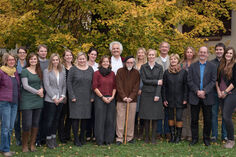Psychotherapy research
In psychotherapy research, we conduct various multi-method studies, including:
Randomised Controlled Trials (RCTs)
- Neurobiological Mechanisms of Early Mother-Infant-Bonding
- Neuroendocrine Mechanisms of Grief and Bereavement
- Cognitively Based Compassion Training
- "Song of Life"
- Music Therapy for Depression (MUSED-study)
- Systemic Therapy and Cognitive Behaviroal Therapy for Social Anxiety Disorders in Adults (SOPHO-ST/CBT)
- Family Constellations in Adults (FCS)
Parallelized Control Studies
- Social Networks of Patients in Psychotherapy and Healthy Controls (BezDiag-PT, BezDiag-G)
Competence and Adherence of Psychotherapists
- Assessment of Competence in Systemic Therapists
- Systemic Therapy Adherence Scale (STAS)
Lanuage and Subjective Experience in Psychotherapy
- Text-based Analyses of Psychotherapeutic Processes in Patient-Therapist-Interaction (LIWC-PT)
- Patients' and Therapists' perspective on their Experience in Systemic Psychotherapy
Generic Change Indicators in Psychotherapies
- Assessment of Change using Generic Change Indicators in Psychotherapies („generic change indicators“, GCIs)
Methods: Systemic Functioning
- Experience in Social Systems Questionnaire (EXIS) - Patients and Therapists
- Burden Assessment Scale (BAS) - Significant Others
- Evaluation of Social System Scale (EVOS)
=> The English version of this website is currently under revision.
Randomised Controlled Trials (RCTs)
NEUROBIOLOGICAL MECHANISMS OF EARLY MOTHER-INFANT-BONDING
Despite the challenges of motherhood, most mothers feel an immediate, strong bond with their newborn. This bond is expressed in care-giving behaviors and sensitivity to the needs of the infant. Neurobiologically, this bond is accompanied by an activation of the reward system in the brain. However, approximately 10% of all mothers’ report difficulties in bonding with their child with increasingly evidence suggesting long-term negative effects for mental and physical health child development.
Neurofeedback is a new, still experimental, intervention technique in which participants gain direct feedback on their brain activity and learn to control areas of activation. Previous studies suggest that activation of specific regions can be up- or down-regulated through neurofeedback training in clinical conditions that correlate with hypo- or hyper- activated brain activity. Based on research on the psychobiological mechanisms of bonding, this study aims to investigate if bonding-relevant activation of the reward system can be increased and whether this improves maternal bonding and mother-child interaction behaviour.
Duration: | 2017–2020 |
Funded by: | |
Head: | Beate Ditzen, Monika Eckstein, Anna-Lena Zielow |
Contact persons: | Monika Eckstein, Anna-Lena Zielow, Britta Zipser, Helena Pinto-Ribeiro |
Cooperations: | Dr. Daniela Noe, Klinik für Allgemeine Psychiatrie im Zentrum für Psychosoziale Medizin, Universitätsklinikum Heidelberg Prof. Dr. Peter Kirsch, Zentralinstitut für seelische Gesundheit, Medizinische Fakultät Mannheim, Ruprecht Karls-Universität Heidelberg |
NEUROENDOCRINE MECHANISMS OF GRIEF AND BEREAVEMENT – CONCEPTUALIZATION AND EVALUATION OF A COUPLE INTERVENTION AT THE END OF LIFE
The lethal disease of a partner is a critical life event which is accompanied by a strong burden for the couple. Care taking partners are sometimes referred to as „hidden” patients because they themselves are subject to physical and psychological problems. A few bereaved may also manifest a diagnosable mental disorder. The main objective of this study is to design an intervention for couples with a terminally ill partner. The intervention is based on Harvey Chochinov’s dignity based therapy which is a biography oriented short intervention for patients at the end of life.
Burdened couples are randomly assigned either to the dignity based therapy group or to a control group. The female partner receives a clinical diagnostic at pre- and post-intervention, together with blood samples and an echo cardiogram will be conducted to assess indicators of Takotsubo cardiomyopathy. On two consecutive days, saliva samples are taken to measure cortisol, and oxytocin and alpha amylaselevels. The effectiveness of the intervention is evaluated with regards to the healthy female partner’s subjective wellbeing and to the psychobiological reaction of the mourning process.
Planned duration: | 2020-2023 |
Funding: | |
Management: | |
Contact persons: | Dora Hopf, Corina Aguilar-Raab, Monika Eckstein |
Music therapy for women with depression (MUSED study)
Depression are among the most widespread mental disorders worldwide, with women more often affected than men.
Depression can affect many areas of experience and behavior and is often accompanied by changes in emotion regulation and stress regulation.
Music therapy is an insufficiently researched, complementary therapeutic approach for the treatment of mental disorders. Various reviews from recent years suggest that music therapy could contribute significantly to the successive treatment of depressive disorders in addition to standard therapy. However, due to the heterogeneity of the methods and the results of these prior studies, it is not possible yet to conclusively assess whether the method is effective or not in the treatment of depression.
With the MUSED study, we aim to investigate the effectiveness of a music therapy group approach for women with depression.
For this purpose, the participants are randomly assigned either to the intervention group (10 weeks of music therapy + standard treatment) or to the waiting list control group (initially only standard treatment, music therapy is given at a later date).
The goal of our music therapy offer is to reduce depressive symptoms as well as stress and to increase well-being with the help of active (e.g. free improvisation) and receptive (e.g. sound journey) music therapy interventions.
The effectiveness of the intervention will be evaluated with the help of psychological (depression symptoms, stress, emotion regulation through music, etc.) and psychobiological measures (heart rate variability, salivary cortisol).
The special feature of the MUSED study is the combined collection of psychometric and psychobiological measurements, which, beyond the question of efficacy, opens up possibilities for a better understanding of the underlying mechanisms of the aetiology, course and therapy of depression.
| Planned duration: | 2019 - 2022 |
| Funding: | Graduate Academy of Heidelberg University, Christiane Nüsslein-Volhard Foundation, Steffen Lohrer Foundation, Joachim Herz |
| Management: | Beate Ditzen and Christine Gäbel |
| Contact person: | Christine Gäbel |
| Research team: | Corina Aguilar-Raab, Christine Gäbel, Marc Jarczok, Martin Stoffel, Sabine Rittner und Marco Warth |
| music therapists: | Sabine Rittner, Christine Gäbel |
| Student employees: | Francesca Uhl, Felicitas Sarodnick, Nadja Hollerbach |



